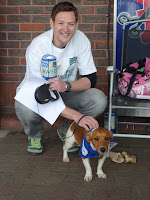With over 150 years of international experience, the RSPCA’s overseas work takes place all over Europe, East Asia and southern Africa, for the benefit of animals and people in society, agriculture, industry and the environment.
When there’s an oil spill in Norway, RSPCA International is there, literally getting their hands dirty cleaning and tending to birds. When tragedy strikes in Haiti, RSPCA International is there – helping communities treat their pets and livestock, and in our own small way helping people get back on their feet and on with their lives.
I'm very excited about a fantastic new RSPCA International project called ‘Clinic in a Box’ – which is running in conjunction with one of our sister organisations: the Lilongwe Society for the Protection and Care of Animals (LSPCA).
The LSPCA’s mission is to rescue and care for animals in Lilongwe and work with local vets, police and government to improve the lives of animals right across Malawi.
They are the first and only animal welfare organisation in Malawi. The LSPCA was started in 2008 by a dedicated group of vets and other professionals who wanted to improve the lives of dogs, cats and farm animals in Lilongwe.
They run regular mobile community veterinary clinics which provide free treatment to animals in the poorest communities in Lilongwe.
Their education officer visits every school in Lilongwe to teach children how to care for their animals and they work closely with the Ministry of Agriculture and the police to stop the illegal selling of puppies and kittens on the side of the road.
They also work with local communities to improve the health of their chickens, which are an important source of income for poor communities.
Clinic in a Box is a project supported by RSPCA International to set up a new veterinary clinic in Malawi, south-east Africa.
The current LSPCA clinic is under a tent, with no electricity or running water. The new clinic will mean better care for animals that really need help.
As a charity, we are looking for donations of everything; including an x-ray machine, dog beds, medicines and more.
Everything will be packed into a huge shipping container and go from the UK to Malawi - literally a 'clinic in a box'!
Now to put this in perspective, I want to tell you about a couple of true stories of animals who have been helped by the LSPCA – and why the existence of a proper clinic, with proper veterinary facilities is of the utmost importance:
Saving Grace
Chisomo ('Grace' in Chichewa, a local language in Malawi) was very sick when LSPCA's vet Dr Richard Ssuna saw her during an LSPCA clinic.
She was close to death through malnutrition, but was still managing to feed four beautiful puppies.
Her family were not able to look after her, so gave her to the LSPCA to be cared for. Chisomo was a gentle dog, despite being in intense pain from a broken leg.
Luke Gamble, a vet from the UK was visiting at the time and making a TV series called 'World Wild Vet'. Richard and Luke took Chisomo back to Richard's house to operate on her to remove her leg. They had to operate in Richard's garage, because LSPCA does not have a clinic.
This meant the operation was much more difficult with no proper equipment or theatre. But the operation went well and Chisomo was soon up and walking on her three legs.
Happily, with lots of food and care from LSPCA, Chisomo made a great recovery and she and all her puppies were found loving 'forever homes'.
Grave Danger
On a very busy day, someone approached the LSPCA vehicle and reported a case of severe animal cruelty to two dogs. In spite of the many other duties, this call was prioritised and a team was sent immediately to assess the situation.
The first sight of the dogs was horrific - two bags of bones, covered in fleas and lice, totally bald and motionless. They both used what little strength they had left to try and get away. Because of the abuse they had endured over the years, they had little trust for humans.
Since they had little energy left due to starvation, they could not run but resorted to snarling when the LSPCA workers attempted to catch them.
Although the LSPCA did not find the owner, it was revealed that these two were just about to be buried alive. The LSPCA workers even found a deep hole had already been dug - so they had got there just in time. An hour later might have been too late.
All effort was directed in getting the two back to get health; they were taken to the quarantine site for rehabilitation. They were immobile and unresponsive to anything for the first two days but responded well to food.
But with lots of love, patience and care, the two dogs - Buddy and Buster - soon started getting up and responding to their environment. They were dewormed, vaccinated and bathed. The mange, the wounds and the flies were all taken care of and soon their fur grew back!
Unfortunately Buddy had to be put to sleep later due to medical problems as well as failure to socialise with both people and other dogs, but Buster has just been adopted by a Norwegian family.
His life history touched them and they could not resist the urge to provide a good home for him.
How can you help?
Your donation will help us save more animals. If you have a UK mobile, you can donate by text. Just text CARE33 and the £amount to 70070. You can donate £1, £2, £3, £4, £5 or £10.
For example to donate £3, just text CARE33 £3 to 70070.
Calie Rydings, RSPCA press officer


































